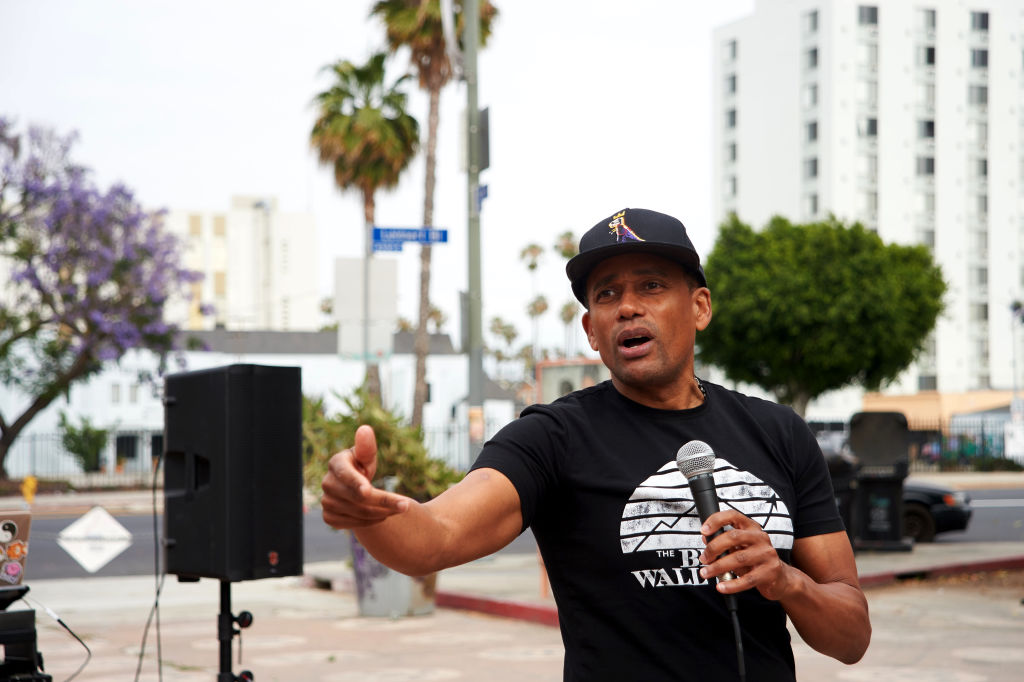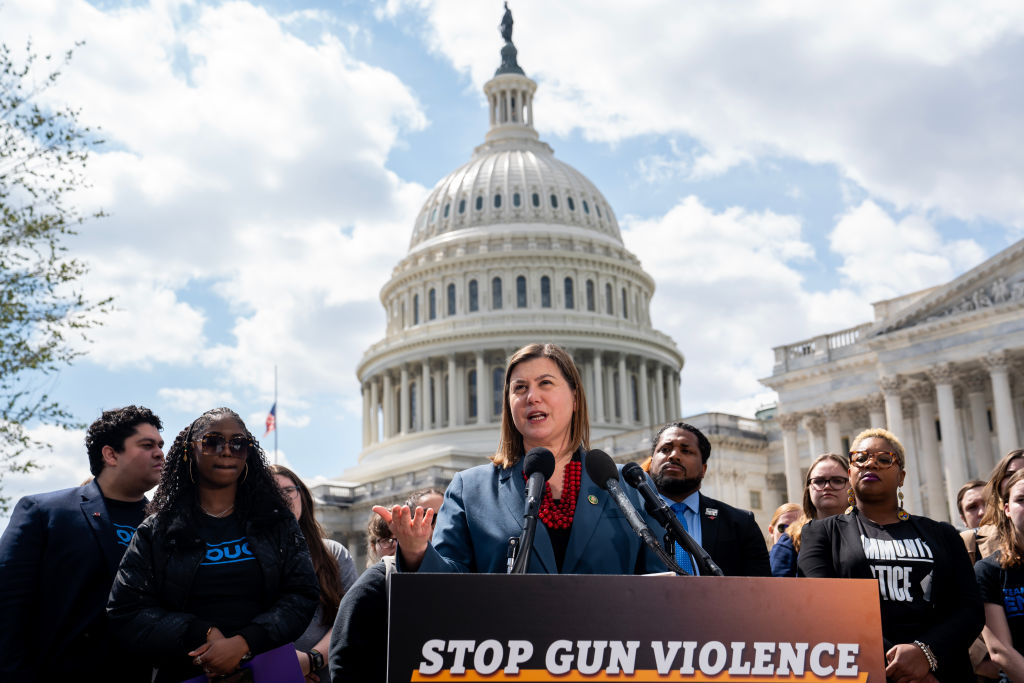
Hill Harper is best known for playing a medical examiner on CSI: NY and a surgeon on The Good Doctor. Those hit shows have given him fortune and fame, but he is determined to not let them define him in the coming weeks, as the 57-year-old auditions for a different role, that of Michigan’s next Senator. In jumping into an open race, Harper is testing whether the state’s Black and progressive voters can overpower the preferred pick of national Democrats and many of the state’s most powerful figures.
Harper’s allies say those dismissing his bid as ill-considered are looking only at his acting career, and not his decades of activism, authorship, and community investment that would normally be seen as an ideal resume for a candidate. Harper himself thinks his multifaceted background could provide a welcome alternative to the “career politicians” that pervade Washington.
“We have too many of them, and nothing’s getting done, and people know it,” Harper tells TIME. “I love Michigan because of the richness of diversity. And people here keep asking me, why isn’t the richness of the diversity of experience in the state represented in Washington, D.C.? And it’s not. And I think they want that.”
He’ll have to make his case in a field that Rep. Elissa Slotkin has dominated for months. Harper, who announced his candidacy on Monday, has brought on local and national strategists to prepare for a campaign that can go the distance. According to multiple Harper allies, members of Congress have called him to discourage him from running.
More from TIME
“One thing I’ve learned from traveling all over the state of Michigan that I’m super happy about, and also encouraged by, is that Michiganders don’t want their next U.S. Senator chosen by the Washington, D.C. establishment,” Harper says.
Michigan’s Senate race is not seen as one of the top battlegrounds for 2024, but it is one that could be in play. With several Democratic Senators facing tough reelection fights in red states, losing even one race could cost the party control of the chamber. But long before next November, Michigan could reveal what Democrats really want from their party in the Biden era.
Despite his brand as an established Hollywood actor, Harper’s bio reads less like Arnold Schwarzenegger and more like one of his former Harvard Law School classmates, Barack Obama.
Harper enrolled there after graduating from Brown with an economics and sociology degree. He and Obama played basketball together, and when the latter launched his bid for President, Harper was among the celebrities who campaigned for him. (Asked if Obama would back Harper’s Senate bid, Obama spokesperson Hannah Hankins tells TIME, “President Obama does not generally weigh in on Democratic primaries and will not be endorsing in this one.”)
By 2012, Harper was nearing the end of his nine-year run on CSI: NY and had penned several New York Times best sellers, including one that drew on his experience surviving thyroid cancer. That’s when Obama appointed him to the President’s Cancer Panel.
Barbara K. Rimer, one of the panel’s other two members, was initially skeptical: “When I heard that an actor had been appointed, I thought, ‘Oh, boy, we’re really going to be a two-person panel here, and the actor is going to come in and take pictures,’” she recalls. “Hill turned out to be just the complete opposite of that.”
Between auditions, he seldom missed a meeting. He stayed at the same no-frills, government-approved hotels as the other members. He did the background reading and was particularly interested in getting the group to understand the health challenges of Americans of color. According to Rimer, Harper’s communication skills helped them produce clearer reports, and his star power didn’t hurt either.
“When he walked into the room, partly because he was an identifiable actor with a good reputation, people, even serious scientists, fell all over themselves,” Rimer says.
In more recent years, Harper has become a more visible figure in the Detroit activism scene. He has served as an ambassador for organizations backing civil rights, criminal justice reform, and a higher minimum wage. Early in the pandemic, he could be found delivering water to Flint residents. Around the same time, he called Rimer back to ask how he could best help encourage people of color to get vaccinated.
In 2017, he purchased Detroit’s landmark Charles T. Fisher mansion, an ornate, 18,000-foot home that he promptly began renovating. “This house, to me, is Detroit’s White House,” Harper told The Detroit News in 2018.
In the lead-up to his Senate bid, Harper has hosted progressive organizers and union members at that home and let them use it as a meeting space.
“The fact that he hasn’t been an elected official doesn’t mean he hasn’t been a public servant,” says Jeff Johnson, a strategist and managing director at consulting firm Actum LLC who became friends with Harper two decades ago.

But the first-time candidate will face stiff competition from Slotkin, a member of the bipartisan Problem Solvers Caucus who many see as heir apparent to retiring Senator Debbie Stabenow. The day Stabenow announced her retirement in January, Slotkin could be seen weaving past reporters to take a phone call outside of the House chamber. In March, Politico reported that Stabenow and Senate Majority Leader Chuck Schumer successfully steered several other would-be contenders away from the Senate race, essentially clearing the field for Slotkin, who the party considers a stellar candidate for the open seat.
“We’ve got a very conservative Democrat who really seems to be the chosen of the establishment here in the state,” says Mike McCurdy, chair of the mid-Michigan Progressives. “While she’s good for her own district, we think she’s too conservative for the state as a whole.”
Slotkin’s campaign declined to comment for this story.
Michigan is a battleground, but many strategists anticipate that other Senate races will be more competitive. The Great Lake State has elected only two Republicans to the Senate in the past sixty-some years. In the 2016 Democratic presidential primary, its voters opted for Vermont Senator Bernie Sanders.
It was Slotkin’s moderate brand that won her reelection last year in a Trump-supporting district. During that race, she became the first-ever Democrat to earn an endorsement from former Rep. Liz Cheney. She has faced criticism from the left for voting in 2020 against $10,000 in student loan assistance and for failing to embrace “Medicare for all.” (Slotkin voted against a House resolution earlier this year that aimed to undo President Joe Biden’s student loan relief plan.)
“I like Elissa Slotkin,” says Lori Goldman, a Michigan realtor who founded Fems for Dems in 2016 and supports Harper. “I think she’s wonderful. But she’s not a progressive progressive. If we can win this race, and we can put a progressive in, why in God’s name don’t we do that?”
Asked about his policy platform, Harper calls out the Supreme Court’s recent ruling striking down Biden’s student loan relief plan.
“I look at the student loan debt crisis as one of the biggest issues,” he says. “We know the system’s broken, and folks don’t have the political will to do something about it. And I want to even go farther than just paying off $10,000 in student loans. … We need quality, free pre-K through college.”
He also emphasizes his commitment to affordable physical and mental health care. Asked if he backs “Medicare for all,” he says, “I don’t want to inherit other people’s terms. I think that inheriting other people’s terms saddles me with the people who actually use those terms, and I can’t say that I agree 100% with all the people who use those terms.”
Harper’s allies tell TIME that their policy conversations with the actor have centered on these priorities, as well as lowering taxes for those who are not rich. They like that he’s a union member—if elected, he says he’d be the only one in the Senate—but he’s also a small business owner; Harper owns a downtown Detroit coffee shop he bought in 2017. They predict he’ll end up knowing as much about some policy issues as his staff.
Johnson describes Harper as a progressive who won’t let that label get in the way of his pragmatism.
“Hill, to me, is the kind of person that is a throwback, and that he will vehemently fight for the things that he believes should exist,” says Johnson. “But he’ll also go and have a drink with somebody on the other side of the aisle when it’s all over.”
Johnson knows a thing or two about first-time candidates running against more established players. Last year, he chaired the independent expenditure for Maryland Governor Wes Moore, who he and Harper count as a mutual friend. Moore, most famous as an author before he was elected, became the state’s first Black governor last year after defeating former Democratic National Committee chair Tom Perez in a close primary. To Johnson, both men represent a new kind of politician.
“It’s normally white men who have not only the resources, but the cachet, to be the non-traditional candidate,” he says.
If there’s a kind of candidate who could challenge a frontrunner as strong as Slotkin, it’s probably Harper. He has access to wealth that could help power what is sure to be a pricey campaign, but it’s his personal network that might be his greatest asset. He has particularly strong connections with other Black leaders. Senator Cory Booker of New Jersey has reportedly encouraged him to run.
Last weekend, Harper tells TIME, Georgia Senator Raphael Warnock came to visit him at his Detroit home.
“We got a chance to talk at length,” Harper says. “And one of the biggest questions I had was asking him, since he’s a relatively junior senator, did he feel like he could have a real impact and did he think that, if I won, I could have real impact? And his answer was emphatically ‘Yes.’”
“Our communities have been let down too much by politicians,” Harper continues. “And I’m not interested in being another person who wins an office that lets them down. So they know I’ll fight for them and I’ll get my elbows out. And they know I’ll deliver. Senator Warnock believes that I can, if I’m in that seat.”

Racial politics are sure to play a role in the primary. Michigan has never had a Black Senator. The only Black member of the state’s current congressional delegation is newly-elected Republican John James. This year, for the first time since 1955, Detroit does not have a Black representative in Congress. Another Black Democrat, Michigan State Board of Education member Pamela Pugh, is already running for the Senate seat.
“This is a seat that should be held by a person of color,” says Goldman, who emphasizes that she’s a suburban white woman.
The primary follows last year’s midterms in which Black challengers lost Senate races to Republicans in Florida, Wisconsin, and North Carolina, while Warnock won reelection after a hard-fought campaign and runoff. It also comes years into the Democratic Party’s effort to demonstrate that it is not taking Black voters, a key segment of its base, for granted.
“Without Black voters, Michigan is a red state. It’s really important that people understand that,” says Quentin James, founder and president of the Collective PAC, which works to build Black political power.
Indeed, exit polls suggest that Black voters were pivotal for Biden and Democratic Governor Gretchen Whitmer in winning the state in the 2020 and 2022 elections. A 2018 analysis found that 13% of eligible voters in the state were Black, more than in all but three other battlegrounds. Harper is expected to show strength among urban Black communities, among which Slotkin is not known for her outreach.
Many Republicans are nonetheless anticipating that Slotkin will be the Democratic nominee and are not even considering the possibility that Harper could defeat her. “Who?” several asked upon hearing his name in recent weeks.
Despite his years of work on successful TV shows, Harper’s biggest challenge over the coming months will be building name recognition across Michigan and showing voters his experience beyond acting. His first-time candidate status will also leave opposition researchers with decades of potential baggage to examine. In particular, they may question his Michigan ties. Harper is often out of state; he shoots The Good Doctor in Vancouver and stays in Canada when filming, though he says he lives in his Detroit home the rest of the time. Asked if he plans to continue filming the show during the campaign, he says it’s too early for him to comment given the ongoing and potential strikes in Hollywood. He doesn’t seem worried about how it might impact his Senate bid.
“In recent election cycles, we’ve seen evidence that campaigns powered by the people can be very successful against campaigns that are powered by the establishment, powered by these big-dollar lobbyists and big-dollar donors,” Harper says. “That’s what we plan to do. We plan to have a campaign that’s for the people, by the people. Because I’m one of the people.”
More Must-Reads from TIME
- Cybersecurity Experts Are Sounding the Alarm on DOGE
- Meet the 2025 Women of the Year
- The Harsh Truth About Disability Inclusion
- Why Do More Young Adults Have Cancer?
- Colman Domingo Leads With Radical Love
- How to Get Better at Doing Things Alone
- Michelle Zauner Stares Down the Darkness
Write to Mini Racker at mini.racker@time.com